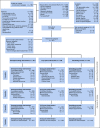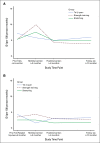GET FIT: A Randomized Clinical Trial of Tai Ji Quan Versus Strength Training for Fall Prevention After Chemotherapy in Older, Postmenopausal Women Cancer Survivors
- PMID: 36888933
- PMCID: PMC10414741
- DOI: 10.1200/JCO.22.01519
GET FIT: A Randomized Clinical Trial of Tai Ji Quan Versus Strength Training for Fall Prevention After Chemotherapy in Older, Postmenopausal Women Cancer Survivors
Abstract
Purpose: To compare the efficacy of tai ji quan versus strength training to prevent falls after chemotherapy in older, postmenopaual women.
Methods: We conducted a three-arm, single-blind, randomized controlled trial where older (50+ years), postmenopausal women cancer survivors participated in one of three supervised group exercise programs (tai ji quan, strength training, or stretching control) twice weekly for 6 months and were followed up 6 months after training stopped. The primary outcome was the incidence of falls. Secondary outcomes included fall-related injuries, leg strength (1 repetition maximum; kg), and balance (sensory organization [equilibrium score] and limits of stability [LOS; %] tests).
Results: Four hundred sixty-two women were enrolled (mean age, 62 ± 6.3 years). Retention was 93%, and adherence averaged 72.9%. In primary analysis, there was no difference in the incidence of falls between groups after 6 months of training, nor during 6-month follow-up. A post hoc analysis detected a significantly reduced incidence of fall-related injuries within the tai ji quan group over the first 6 months, dropping from 4.3 falls per 100 person-months (95% CI, 2.9 to 5.6) at baseline to 2.4 falls per person-months (95% CI, 1.2 to 3.5). No significant changes occurred during 6-month follow-up. Over the intervention period, leg strength significantly improved in the strength group and balance (LOS) improved in the tai ji quan group, compared with controls (P < .05).
Conclusion: We found no significant reduction in falls for tai ji quan or strength training relative to stretching control in postmenopausal women treated with chemotherapy.
Trial registration: ClinicalTrials.gov NCT01635413.
Conflict of interest statement
The following represents disclosure information provided by authors of this manuscript. All relationships are considered compensated unless otherwise noted. Relationships are self-held unless noted. I = Immediate Family Member, Inst = My Institution. Relationships may not relate to the subject matter of this manuscript. For more information about ASCO's conflict of interest policy, please refer to
Open Payments is a public database containing information reported by companies about payments made to US-licensed physicians (
No other potential conflicts of interest were reported.
Figures


Comment in
-
Tai Ji Quan and Fall Risk.J Clin Oncol. 2023 Sep 10;41(26):4315-4316. doi: 10.1200/JCO.23.00690. Epub 2023 Jun 28. J Clin Oncol. 2023. PMID: 37379496 No abstract available.
References
Publication types
MeSH terms
Associated data
Grants and funding
LinkOut - more resources
Full Text Sources
Medical

